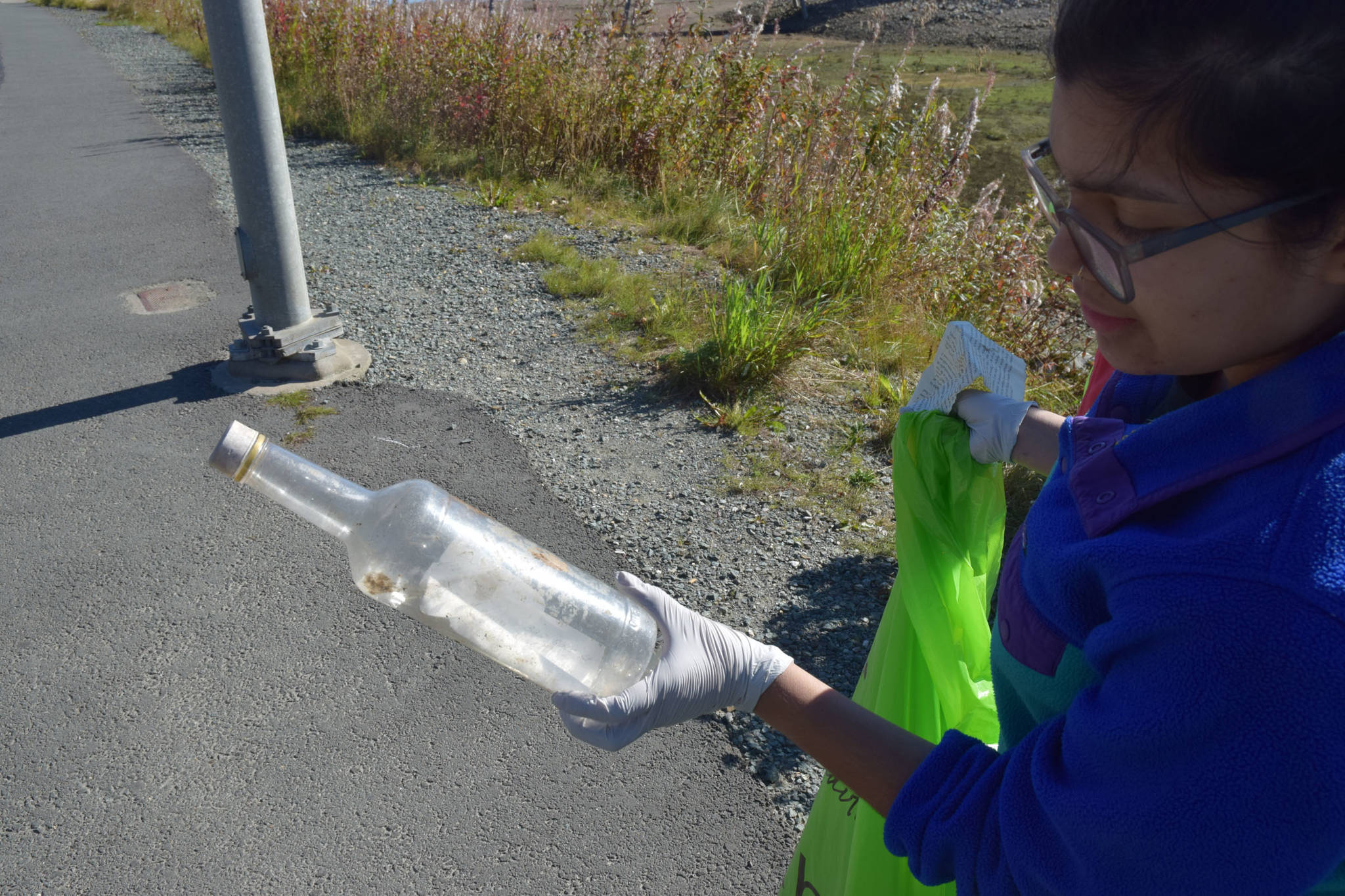While picking up trash near the Juneau Seawalk on Saturday, local high school student Ashling Cruz found a message: A piece of paper folded to fit into a clear plastic bottle.
From the looks of it, the message in a bottle hadn’t made it very far.
“It’s got his name and address. It’s from here,” Cruz said.
Into a garbage bag the bottle went. If Cruz wasn’t there to clean it up, it may take thousands of years to disintegrate. Eventually, some kind of marine life might consume it, or get it lodged in a nostril or beak.
Avoiding this is one of the aims of the International Coastal Cleanup, an annual event which took place this Saturday at Mayor Bill Overstreet Park and near the Juneau Seawalk. About 800,000 people came out last year around the world to remove trash from coastal shorelines. Seventeen communities across Alaska participated this year, with a few dozen volunteers showing up Saturday to help in Juneau.
The Ocean Conservancy organizes the event. Locally, National Oceanic and Atmospheric Administration Marine Mammal Specialist Alicia Schuler helps organize volunteers.
Schuler handed out yellow and green trash bags to groups of volunteers before the event, and explained to the Empire why it’s crucial to keep coastal environments trash free. By 2015, Schuler said, it’s estimated that the mass of plastic in the ocean will exceed that of fish.
“Plastics entering the ecosystem is a major issue in the world today,” Schuler said. “It can become food for things salmon, halibut in the ecosystem, and we end up eating those fish that have eaten plastic and that becomes a human health issue.”
Before plastics breakdown into small enough pieces for smaller fish to eat, it can become a hazard for larger animals like whales, sea lions and seals, Schuler said.
“Trash in the marine environment can become an issue for anything,” she said.
This year’s Coast Cleanup served a dual purpose. Two local schools, Sayéik Gastineau Community School and Thunder Mountain High School, are starting up local chapters of the national Ocean Guardian Schools program.
The National Marine Sanctuary Fund organizes and helps fund the program, but students lead it, developing conservation, cleanup and advocacy efforts to protect and conserve local watersheds, Schuler said.
Juneau doesn’t have a National Marine Sanctuary nearby and isn’t eligible for funding from the National Marine Sanctuary Fund. So to kickstart the program, Schuler and organizers for International Coastal Cleanup partnered with Litter Free Inc. to raise funds to get their own programs started. Litter Free Inc., a local nonprofit, pays volunteers to pick up trash locally.
Both school programs aim to reduce marine debris. Students at Gastineau are hoping to eliminate single-use plastics in their cafeteria and replace their plastic forks with reusable ones. Thunder Mountain’s Ocean Guardian group is still developing an agenda, but Schuler said they’ll be fundraising for marine debris efforts and helping to reduce the use of single-use plastic bottles at the high school.
Both schools are the first Ocean Guardian Schools in Alaska. Schuler and another NOAA employee are helping get the programs started.
“We’re hoping that with the success of this program that we can spread within Alaska. These are kind of our prototype schools,” Schuler said.
Many of the volunteers Saturday were young people like Cruz. A junior at Thunder Mountain High School, Cruz was flanked by two of her classmates, junior Emma Douglas and senior Ashley Murphy. They worked their way around the Seawalk and the waterside of Egan Drive.
All three said they’re learning a lot in their courses about how trash — especially plastics — can harm the marine environment.
“We’re actually learning how much litter and plastic there is everywhere and how people don’t care about it,” Cruz said.
They’re all helping to start the Ocean Guardian Schools program at TMHS. There’s awareness building in their generation, the high schoolers agreed, but people sometimes “need that push.” That could lead to change, Douglas said.
“We hope to bring it to people’s awareness, that we need to be the generation to change it,” Douglas said.
• Contact reporter Kevin Gullufsen at 523-2228

